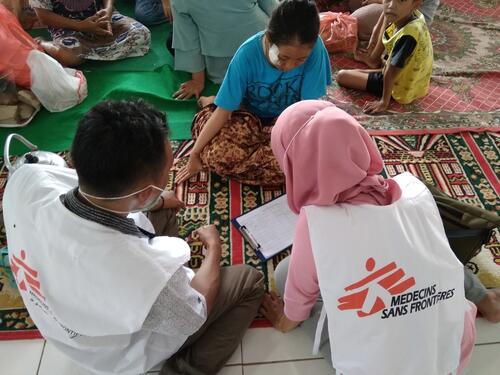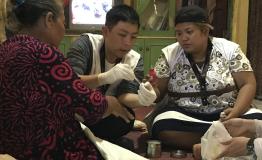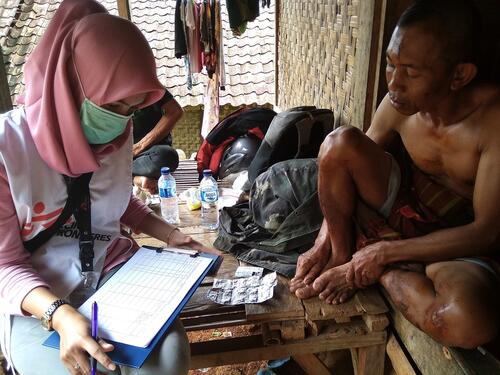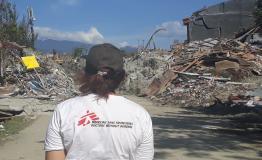According to the Indonesian National Disaster Management Agency (BNPB), as of 14.00 local time on 25 December, a total of 16,082 people had been displaced in the five districts – Pandeglang and Serang in Banten Province, and Lampung Selatan, Tanggamus, and Pesawaran in Lampung Province – affected by the tsunami that hit Indonesia’s Sunda Strait late in the evening of 22 December 2018.
Figures provided by the Indonesian National Disaster Management Agency (BNPB), as of 14.00 local time on 25 December
16,082
16,082
1,485
1,485
429
429
MSF quickly mobilised three teams: one in Lauban, one in Carita and one mobile team.
Labuan
In Labuan, MSF has a medical team stationed in the health centre to support the delivery of outpatient medical care.
To date, Labuan Health Center has admitted 74 wounded and discharged 66 patients. A total of 8 patients have been referred to the hospital, and 9 bodies have been received.
There are still many people currently visiting the centre to seek treatment despite power cuts in the area.
Carita
In Carita, MSF was unable to reach the centre on 26 December, due to the flooding caused by heavy rains that started the previous evening.
Medical coordination with the health centre staff is being conducted via phone calls.
As of 25 December, the Carita Health Center admitted 99 injured patients who were immediately released after treatment. The centre has also received 65 bodies.

Mobile clinic
Aside from supporting the health centres, MSF has been conducting a mobile clinic from the third day after the tsunami hit the area.
“We visited the survivors who have evacuated to higher ground by foot,” explains Dina Afriyanti, an MSF midwife. “Some of them have been injured as they were either trying to escape the rising water or as they were hit by rubble.”
“We saw many injured people in the remote communities who had not received any treatment,” Dina recounts. “So, we cleaned and dressed their wounds. Afterwards, we will conduct follow-up visits to check on their condition and make sure that they heal properly.” said Dina Afriyanti, an MSF midwife.
Sulaiman Warawu, an MSF health promoter, reiterates: “As MSF has been here in Banten since early this year for the adolescent health project, this area feels like home. So, we are committed to supporting the health centres and the people affected. We will continue conducting the mobile clinic and will also do follow-ups to ensure the full recovery of the patients.”
MSF figures, 9 January 2019
106
106
677
677
500
5

On 5 January 2019, the Indonesian government officially declared the end of the tsunami emergency response in Banten Province.
Some humanitarian organisations have withdrawn their presence and resources from the Labuan and Carita subdistricts as a result, but MSF will continue its medical interventions in the tsunami affected areas.
“MSF will be staying in Banten for the longer term as we have been running an adolescent health project in the area since early February 2018,” explains Daniel von Rège, MSF’s head of mission in Indonesia. “We have offered to provide follow-up medical care to the victims and survivors of the tsunami and help in the recovery phase.”
As of 7 January 2019, MSF had treated a total of 783 patients: 106 in the health centres of Labuan and Carita, and 677 through mobile clinics.
Moving forward, MSF is looking at extending its medical support to the health centres in the villages and hamlets during the recovery phase.
On 9 January, MSF distributed hygiene kits to 500 households of internally displaced people (IDPs) living in IDP sites and host communities. The hygiene kits comprise a bucket, soap, toothpaste, toothbrush, towel, sanitary napkin, detergent, dish soap, rubbish bag, and underwear for men and women.






